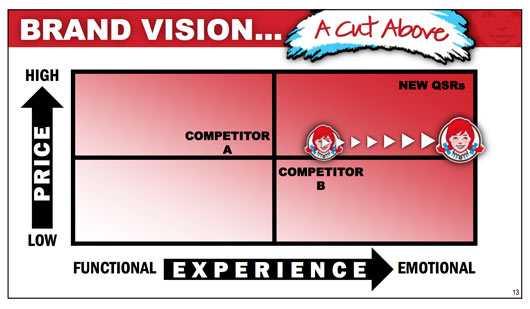CIW’s message, action at shareholder meeting strike a chord with national press…
Scenes from a shareholders’ meeting: As Wendy’s CEO Emil Brolick wound up his presentation at last Thursday’s annual meeting, just ahead of the highly-charged Q&A session, he unveiled an attractive powerpoint presentation centered around a graph that charted the course for the company’s continued growth and success in the future.
Mr. Brolick’s presentation focused on the need to connect with consumers’ emotions. The graph divided the screen into four quadrants, showing three other major fast-food companies in the upper right hand corner (that’s the positive x/y quadrant, for all you math fans out there), signifying that those companies’ consumers had forged strong emotional connections to those brands. Wendy’s was to the left of those other companies, signifying that Wendy’s was lagging, relative to the competition, in the area of emotional connection. Mr. Brolick proceeded to draw an arrow from Wendy’s over to the right hand edge of the +x/+y quadrant, indicating that Wendy’s priority going forward would be to ensure that its customers, too, develop a deeper emotional connection to the Wendy’s brand. The graph was similar to the image below, which can be found in Wendy’s latest earnings webcast for investors:

It sounded like a bold plan, indeed, but by the time the meeting was over, about the only emotional reaction most consumers would have to Mr. Brolick’s less than forthright explanations of Wendy’s refusal to participate in the Fair Food Program would be profound disbelief, as in: “You can’t be serious.”
We begin today’s media round-up with an in-depth report on the proceedings from truthout.org. Here’s an excerpt:
Kerry Kennedy and Farmworkers to Decry Wendy’s at Manhattan Stockholders Meeting“… During the annual shareholder meeting Brolick stated that Wendy’s was already participating in the Fair Food Program because the company purchases its tomatoes from growers in the Fair Food Program. He also said that they were paying a premium for their tomatoes.
Mr. Brolick’s misleading statements were categorically refuted by Gerardo Reyes and Rev. Damico. ‘Wendy’s is not participating in the Fair Food Program but its CEO has claimed in front of its shareholders that it does,’ Gerardo said to Brolick.
‘Wendy’s has not signed a fair food agreement with the CIW. Wendy’s is not paying a penny premium to increase workers’ pay. And Wendy’s has not committed to using its purchasing power to eradicate abuses in the the fields together with growers and farmworkers. Saying that Wendy’s is participating in the Fair Food Program when it is not it undermines the concrete commitment and contributions of the eleven corporations that actually are participating and creates a misleading picture for its shareholders and customers.’ […]
The FFP was heralded in the Washington Post as ‘one of the great human rights success stories of our day’ and in a White House report concerning efforts to combat human trafficking as ‘one of the most successful and innovative programs‘ to that end.
‘Wendy’s calls itself ‘a cut above’ its competition,’ stated Oscar Otzoy of the Coalition of Immokalee Workers, ‘yet, Wendy’s is a cut below the rest of its key competitors when it comes to human rights, as the nation’s only major fast-food chain not participating in the Fair Food Program. They may take pride in their old-fashioned burgers, but it is definitely time for Wendy’s to end their old-fashioned approach to the human rights of the farmworkers who harvest the tomatoes inside those burgers.’” read more
The truthout.org coverage was only a small part of a virtual flood of media on the contentious meeting. After the mobilization of over 300 marchers in the streets of New York in the days leading up to the shareholders’ meeting, the compelling presence of farmworkers and allies both inside and outside of their shareholder meeting itself, and a lively protest at their headquarters a few days later, widespread media coverage of the protests was the last thing Wendy’s needed. But that’s exactly what they got.
We had already mentioned the Washington Post and Wall Street Journal stories in our last post, and the fact that the AP story ran in literally hundreds of papers across the country. But the coverage ran deeper, and wider, than that. Even the food industry journals got in on the media scrum. Nation’s Restaurant News, the premier news source for information on the restaurant industry, covered the CIW’s press conference and call for Fair Food:
Protesters rally at Wendy’s shareholder meetings
” … The Wendy’s Co. also came under fire from protesters in New York when the Coalition of Immokalee Workers, a farm workers organization based in Florida, assailed the Dublin, Ohio-based chain for refusing to join the Fair Food Program, a corporate and social responsibility agreement for Florida tomato pickers.
Participants rebuked Wendy’s officials for declining to participate in the program, which had already been signed by McDonald’s, Burger King, Taco Bell and Subway. The Fair Food Program is aimed at improving wages and working conditions for Florida farm workers and calls for a stricter code of conduct for suppliers concerning labor rights. Participating restaurant chains agreed to pay an extra penny per pound for tomatoes grown in Florida.
Speaker Kerry Kennedy, daughter of Robert Kennedy and president of The Robert F. Kennedy Center for Justice and Human Rights, praised the CIW for making “extraordinary progress” and urged Brolick to sign the agreement…” read more
… as did QSR web, another major hub of information about the fast-food industry, noting the flurry of criticisms facing the Dublin-based fast food chain (and providing a remarkably objective look at the Fair Food Program in the process):
QSR worker protests spread to DC, shareholders’ meetings
“The Coalition of Immokalee Workers (CIW) — a farmworker organization — will host a press conference outside of Wendy’s shareholders’ meeting to denounce the company’s refusal to join the Fair Food Program (FFP), a corporate social responsibility program for Florida tomato pickers.
According to a news release, Wendy’s is the only of the nation’s five largest quick-service chains to reject the FFP, which has won the praise of the White House and the United Nations for its success in addressing farm labor abuses. Chipotle recently endured similar protests and ended up joining after a six-year debate.
The Fair Food Program is a partnership among farm workers, Florida tomato growers, and 11 leading food corporations. By committing to the FFP, participating corporations demand more humane labor standards from their Florida tomato suppliers and purchase exclusively from those who meet these higher standards, among them required time clocks, health and safety protections, and a zero-tolerance policy for slavery and sexual harassment. Participating corporations also pay a “penny-per-pound” premium, which is passed down through the supply chain and paid out to workers by their employers. Since 2011, buyers have paid $10 million into the FFP.” read more
And it didn’t end there. Wendy’s indefensible decision — indefensible even to its own shareholders, as you’ll recall from last week’s post — to remain the only major fast food chain on the wrong side of history was noted everywhere from Labor Notes and Democracy Now! to the Columbus (Ohio) Business First and La Jornada, one of Mexico’s major national newspapers.
In the aftermath of last week’s shareholders’ meeting, the problem facing Wendy’s decision-makers is simple: Mr. Brolick’s powerpoint was right. The 21st-century consumer does take much more information into consideration when deciding what food to eat than did his or her counterpart a generation ago, and the emotional connection that emerges from that information is essential to winning in today’s marketplace. An article in Friday’s USA Today touched on this subject when discussing McDonald’s efforts to reach out to the “millennials,” a key demographic for the fast-food industry (and a key demographic in the growing Fair Food Nation, too!). The story, which provides a series of strategic suggestions for McDonald’s from an industry expert, reads in part:
“Embrace causes. Millennials care about social responsibility, so McDonald’s must, too… Millennials want emotional connections with brands, and want brands to support causes relevant to them, says Yohn.” read more
But the problem with Mr. Brolick’s powerpoint is that you can’t fake social responsibility. Wendy’s can’t claim to be a socially responsible company worthy of its customers’ emotional investment, on the one hand, while on the other being the one remaining holdout from the leading social responsibility program in the US agricultural industry today.
In other words, you can’t credibly claim you’re aiming for consumers’ heartstrings when for all the world your entire business strategy, from top to bottom, appears to be aimed solely at their purse strings. If a small, short-term increase in profits takes precedence over human rights, your rhetoric and your practice will be in open conflict, and that is not a formula for success. Today’s sophisticated consumers will sniff out hypocrisy behind a brand’s carefully constructed image in a heartbeat.
 Bottom line: If Wendy’s is serious about building its brands’ emotional appeal, it’s going to have to clean up some unfinished business with farmworkers in Florida, first.
Bottom line: If Wendy’s is serious about building its brands’ emotional appeal, it’s going to have to clean up some unfinished business with farmworkers in Florida, first.
Meanwhile, in the midwest…
An interfaith delegation of community leaders (and their kids, as you can see from the picture on the right), visited Wendy’s headquarters in Dublin, Ohio, on the same day that protesters were gathered at the shareholders’ meeting in New York.
Under police escort, delegation representative Jessica Shimberg, Associate Chaplain of Ohio Wesleyan University, entered the building to meet with Bob Bertini, Wendy’s beleaguered spokesperson, and to deliver sumofus.org’s message from almost 90,000 consumers from across the country who are calling on Wendy’s to do the right thing.
As Jessica Shimberg put it:
“What we’re doing is sacred. We are people of different faiths and different communities. While we worship by sharing prayers, we also worship with our feet, and with our voices. We are here to invite Wendy’s to be a part of something that is right and just.”
Mr. Bertini’s response to Ms. Shimberg, and to the 90,000 consumers who signed the electronic petition?
“I really don’t want to articulate our reasons right now, but you’ll be seeing our response.“
It can’t be easy being a messenger for a company without a message. We can only hope the message-to-come is the right one.
Check back soon for more from the Campaign for Fair Food, including an update from the Publix front!



